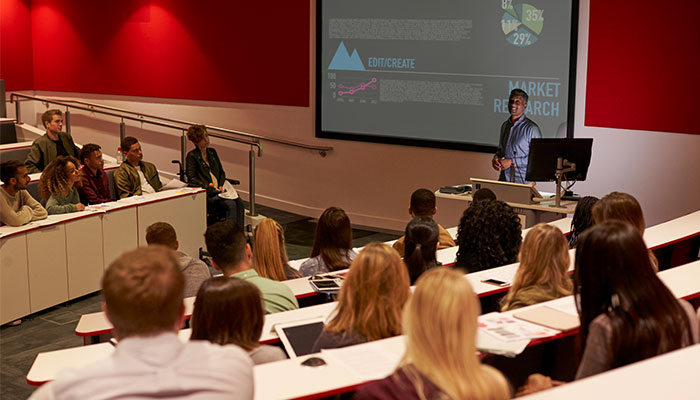During the coronavirus pandemic, the government has allocated more than $300 billion to various programs to support Australians and help get them back to work.

Skills push: JobTrainer targets school leavers with VET opportunities; universities should also be supported to upskill or reskill Australia's workforce.
The JobKeeper program introduced in May was quickly followed by JobMaker which proposed changes to the industrial relations system and offered support to major road, rail and minor infrastructure projects.
The education sector was addressed when the government announced a $2 billion JobTrainer program in mid-July, targeting school leavers with opportunities to undertake traineeships and apprenticeships.
The JobTrainer program deals with equipping school leavers with skills deemed to be of strategic importance by the government.
Workers who thrive are those who are agile and adaptable. What COVID-19 has done is amplify what was already a trend in labour market.
Universities do not qualify for JobKeeper (except for private universities) and have since suffered due to a decline in international student enrolments. With fears of longer-than-expected travel restrictions, together with political tensions between Australia and China, student enrolment numbers are likely to further decline.
To make up for the shortfall in numbers, the government has an ideal opportunity to provide incentives, scholarships and training opportunities in key areas such as health, finance, renewable energy, engineering and teaching.
These are all very much bonded together by the digitalisation of our economy and those of developing countries in our region.
Support for universities, too
No doubt, Vocational education training (VET) plays an important role in Australian society by supporting key business, administrative and technical skills required in the information technology, small to medium business operations and in trades skills required in construction.

Win-win: Certain training programs could be conducted utilising VET and university resources, such as the sharing of physical space and delivering lectures.
With a huge influx of funding proposed for VET, the government should be mindful that if the end goal is to upskill or reskill Australia’s workforce, universities should also be supported as certain training programs could be conducted utilising university and VET resources.
These could be via the sharing of physical space, delivering lectures and using equipment across both institutions.
- The new taboos: how COVID-19 is changing our social world
- Study probes parallel health crises in Victoria
Whether it is the vocational sector or the university sector, both have a role to play in the changing nature of work. In 2017, the Foundation for Young Australians – New Work Smarts report stated that: "It's more likely that a 15-year-old today will experience a portfolio career, potentially having 17 different jobs over five careers in their lifetime".
Workers who thrive are those who are agile and adaptable to dynamic technology, society and economy. What COVID-19 has done is amplify what was already a trend in labour market.
Flexible workforce, flexible economy
Apart from the hard skills that higher education can offer future workers, soft skills and the ability to learn how to learn will be a key that drives a flexible workforce, and in turn, a flexible economy.
A degree should not be taught with the presumption that the job will exist at the end of three years of study. Rather, a degree should be taught in such a way that there is a seamless blend of hard skills, soft skills and a growth mindset – where students are empowered with the ability, willingness and confidence of self-sufficiency.
A school leaver is unlikely to fill the skill gap required for digital innovation, acute health care or high-level social assistance.
As Curtin University’s Distinguished Professor of Higher Education Dawn Bennett states, employability is “the ability to find, create and sustain meaningful work across the career lifespan”.
It would be unwise for the sector to mould students to fit the definition of a well-defined job, with a very specific skill set. As the world changes, and as shocks such as COVID-19 occur, these jobs evolve, or could even become redundant.
A graduate who is agile will be able to create and sustain meaningful work for themselves, irrespective of how the world changes; they are able to re-tool, transform, and add value to society and the economy.
Agility is key
If we extrapolate – an agile workforce and agile entrepreneurs will result in agile industries, which in turn results in an agile economy.
Policymakers should be championing microeconomic policy that incentivises innovations in learning and teaching at higher education institutions which equips teachers, engages students, and empowers a new generation with the agility and the excellence to pro-actively navigate an ever-changing world, rather than policymakers re-actively conducting macroeconomic policy measures on a per-crisis basis.
- Study highlights Anglo-Celtic dominance of our TV news
- Stars in their eyes: how to get kids hooked on science
The government’s JobTrainer is a step in the right direction, but the program seems to focus on equipping school leavers with trade, transport, warehouse and low-level manufacturing skills.
However, a school leaver is unlikely to fill the skill gap required for digital innovation, acute health care or high-level social assistance. The scope of the JobTrainer program seems broad but fails to note the skills required to support the digital economy including SMEs, education, as well as the finance and banking space.
The training provided should not just be for school leavers but for students who aspire to higher education and are likely to make a significant contribution to Australia’s high-end and technologically advanced future. This could be from high value manufacturing to clinical health to preventive medicine.
Dr Lurion De Mello is a Senior Lecturer in the Department of Applied Finance at the Macquarie Business School.
Dr Prashan Karunaratne is a Lecturer in the Department of Actuarial Studies and Business Analytics at the Macquarie Business School.



